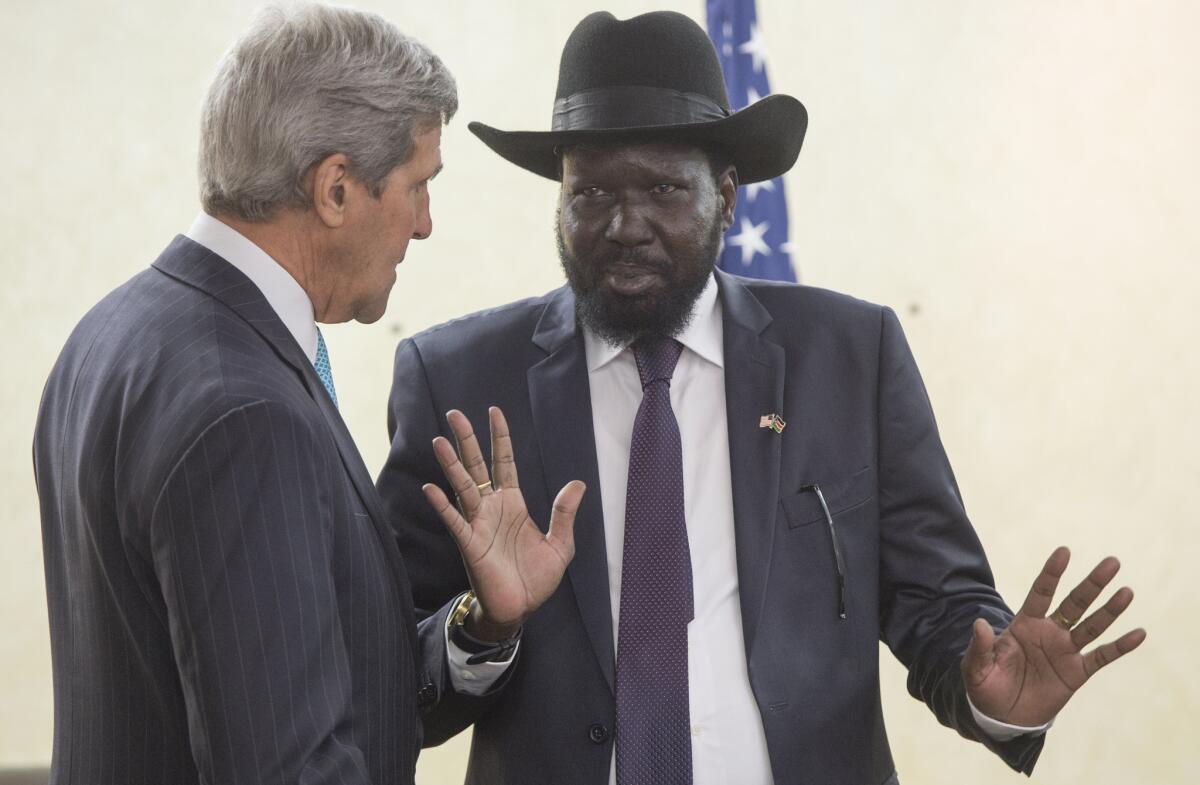Kerry pushes for ‘critical’ talks over South Sudan

- Share via
Reporting from Johannesburg, South Africa — Secretary of State John F. Kerry pressed South Sudan’s president Friday to meet face-to-face with a longtime rival in talks he said were crucial to end fighting that has left thousands of people dead and displaced about a million others.
Kerry flew into the South Sudan capital of Juba and sped to a meeting with President Salva Kiir, announcing afterward that Kiir had expressed willingness to take steps to end the violent conflict which has seen targeted ethnic killings.
“I made it clear to him that he has to do everything in his power to end violence and also begin the process of national dialogue,” Kerry told reporters in Juba, according to agency reports.
Kerry said Kiir was willing to fly to Ethiopia and meet with former South Sudan Vice President Riek Machar, a session Kerry said would be “critical” to resolve the crisis.
“I just spoke a couple of minutes ago to the prime minister of Ethiopia to convey to him President Kiir’s willingness to [travel to] Addis Ababa, sometime early next week, hopefully in order to engage in a discussion ... with Machar,” Kerry told reporters.
Kerry was due to speak to rebel leader Machar by phone later Friday to ask him to meet with Kiir in the Ethiopian capital.
A political struggle between Kiir and Machar late last year plunged the country into ethnic violence and derailed international promises of loans and aid to develop the nation.
Instead of development aid, international aid groups are now seeking $1.27 billion in emergency relief, with fears a famine is looming because farmers have not been able to plant crops.
South Sudan, the world’s newest country, voted for independence in a 2011 referendum, a moment observers said couldn’t have happened without enthusiastic support from the U.S. State Department over many years.
After the country collapsed into violence, some critics said the international community, overly focused on development and aid programs, ignored the problems in the ruling Sudan People’s Liberation Movement, including its lack of democracy and rampant corruption.
A meeting between Kiir and Machar would be the first since the fighting broke out. Tensions rose late last year after Machar and others in the ruling party announced they would contest presidential elections due in 2015. They accuse Kiir of increasing autocracy after he sacked his entire government in July.
Kerry told reporters Kiir had agreed to talks on a transitional government - a common formula to end civil wars in Africa. The arrangement often entails all parties joining in a power-sharing agreement, leading up to elections. But while transitional governments stop the fighting, they often fail to address the underlying conflicts, which may re-emerge later, triggering new fighting.
Kerry said Kiir agreed to “take forceful steps in order to begin to move to end the violence and implement the cessation of hostilities agreement and to begin to engage on a discussion with respect to a transition government.” Kerry offered no details on what form a transitional South Sudan government would take.
He said he told Kiir that both he and Machar faced a stark choice.
“The unspeakable human costs that we are seeing over the course of the last months, and which could even grow if they fail to sit down, are unacceptable to the global community. Before the promise of South Sudan’s future is soaked in more blood, President Kiir and the opposition must work immediately for cessation of hostilities and to move toward an understanding about future governance for the country,” Kerry told reporters.
Both sides signed a cessation of hostilities agreement in January, but neither has observed it. Before flying into Juba, Kerry raised the threat of U.S. sanctions on those encouraging violence in South Sudan. U.N. Human Rights Chief Navi Pillay this week met with Kiir and Machar and later blasted both for their failure to stop the fighting.
Talks have been continuing, on and off, between the two sides for months, with no progress. Fighting and back-and-forth ethnic massacres have persisted.
The conflict has set back South Sudan’s economy and development and dashed hopes that investors, who in December came to Juba in their hundreds for a highly successful investment conference, will materialize.
The conflict has also slashed oil production, which provides 98% of government revenue.
More to Read
Sign up for Essential California
The most important California stories and recommendations in your inbox every morning.
You may occasionally receive promotional content from the Los Angeles Times.













